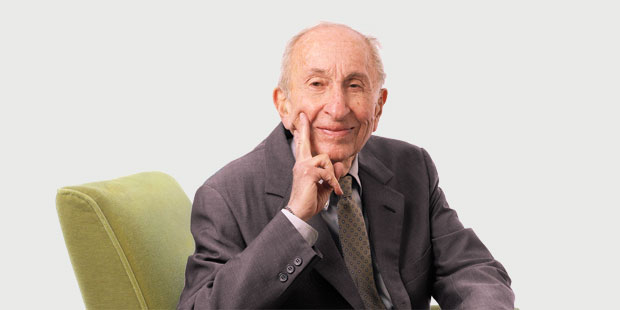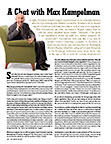A Chat with Max Kampelman
In 1985, President Ronald Reagan reported back to his principal advisers after his first meeting with Mikhail Gorbachev. Members of the departments of Defense and State were there, and so was arms negotiator Max Kampelman ’45, who remembers Reagan saying that he told the newly installed Soviet leader: “Wouldn’t it be great if our negotiations ended up with zero nuclear weapons for everybody?” Kampelman, who was also a top aide to Senator Hubert Humphrey, counselor to Secretary of State George Shultz, and founding host of Washington Week in Review, talked this spring with Daniel Benjamin of the Brookings Institution about what drives him, at the age of 88, to work for nuclear disarmament.
Printer Friendly VersionSo in 1985 how did all of Reagan’s advisers react to the “zero” comment?
There was consternation. His staff and cabinet people very politely tried to point out that it was not in our interest to go to zero. He listened attentively—didn’t argue, didn’t respond. But a year later in Reykjavík he repeated zero to Gorbachev.
Why are you pushing the “zero option” now?
I read in the press after 9/11 that if those airplanes had carried nuclear weapons, New York and Washington would have been destroyed. It scared the living daylights out of me. So I called some of my old staff and asked them, “Were you right or was Reagan right?”
That’s how you became the catalyst behind the “Gang of Four”— former Secretaries of State George Shultz and Henry Kissinger, former Secretary of Defense William Perry and former Senator Sam Nunn— who are advocating eliminating nuclear arms. But with the North Koreans testing their nuclear device and the Iranians enriching uranium, this doesn’t seem the time to go to zero.
All of this makes it essential to go to zero. It’s got to be done universally. It also cannot realistically materialize unless we develop a method of preventing cheating. We must first establish a recognition about the international desirability and necessity of zero, and build on that. It depends on our leadership or the leadership of other countries—and, in my opinion, the declaration of the “ought” by the General Assembly of the United Nations. There is no other vehicle in the world which can establish the “ought.” Now, it is much too weak and unable to bring about the “is,” but it can establish the “ought.”
Would you support the use of force against Iran if it doesn’t stop the development of nuclear weapons?
Yes. If they got it, and the Pakistani scientist admits he sold the goddam thing, I would.
You have always described yourself as a liberal Democrat. How did you become Ronald Reagan’s arms negotiator?
When Reagan was elected, I was in Madrid as President Carter’s negotiator for the Conference on Security and Cooperation in Europe, the continuation of the 1975 Helsinki Conference. I got a call from Al Haig, who was going to be the secretary of state. “The president wants to reappoint you.” I knew Haig quite well and said, “Al, I’m a Democrat.” He says, “He knows you’re a Democrat and he’s reappointing two Democrats: you and Ambassador Mike Mansfield in Japan.” Madrid lasted till 1983, then I was back in private life. President Reagan, out of the blue, calls me up and says, “Max, we’re gonna restart our negotiations on arms.” I knew he had just seen Gorbachev in Geneva. “And I want you to head up the American delegation.” I said, “I’m not equipped—I don’t know the first thing about the nuclear arms issue.” He said, “I know, but you and I worked very closely in Madrid.” And he then said with a laugh, “Actually you’re the only fellow Shultz and [Caspar] Weinberger could agree on.”
As an aide to Humphrey, you worked for the passage of key civil rights legislation. How did you feel seeing an African American sworn in as president?
Really, my chest bursts with satisfaction. My concern is that he is inadequately prepared. But he can learn.
You had been a pacifist during World War II—a pretty unusual thing for a Jewish kid from the Bronx. And as a conscientious objector, you were involved in a range of government-approved activities.
I was an only child; I went to a Jewish school. But the exposure to the world was not there. During the war, I worked as a hospital nurse for mentally handicapped children in Maine, and was involved in soil conservation work and the University of Minnesota’s Starvation Experiment, which was supposed to help the authorities learn what challenges they would face with POWs and concentration camp survivors. We had a 1,500 calorie-a-day diet and 3,000 calorie-a-day work regimen. I went from 161 pounds to under 120.
Looking back on your life, what are you proudest of?
The starvation project. Everything else took time, a little energy—but the thing that hurt and I paid a price for was the Starvation Experiment.
—
All 2009 Features
All of 2009 Alumni Almanac


 Multimedia
Multimedia